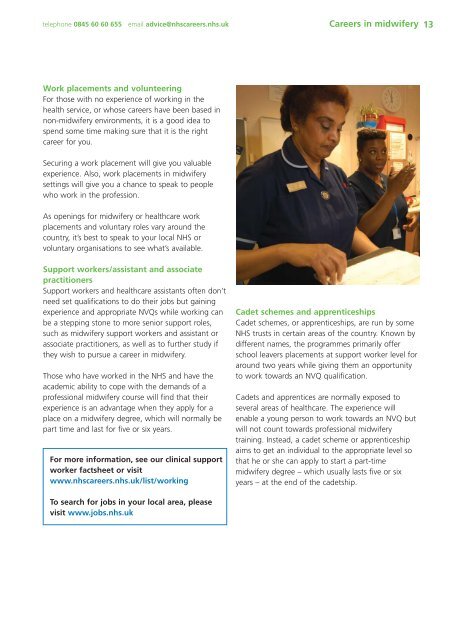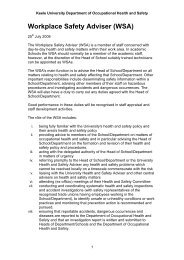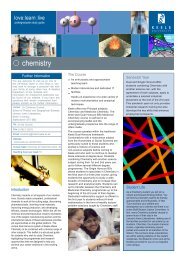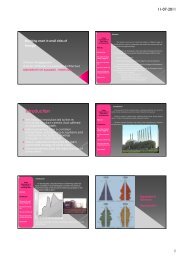NHS guide to Careers in Midwifery - Keele University
NHS guide to Careers in Midwifery - Keele University
NHS guide to Careers in Midwifery - Keele University
Create successful ePaper yourself
Turn your PDF publications into a flip-book with our unique Google optimized e-Paper software.
telephone 0845 60 60 655 email advice@nhscareers.nhs.uk <strong>Careers</strong> <strong>in</strong> midwifery 13<br />
Work placements and volunteer<strong>in</strong>g<br />
For those with no experience of work<strong>in</strong>g <strong>in</strong> the<br />
health service, or whose careers have been based <strong>in</strong><br />
non-midwifery environments, it is a good idea <strong>to</strong><br />
spend some time mak<strong>in</strong>g sure that it is the right<br />
career for you.<br />
Secur<strong>in</strong>g a work placement will give you valuable<br />
experience. Also, work placements <strong>in</strong> midwifery<br />
sett<strong>in</strong>gs will give you a chance <strong>to</strong> speak <strong>to</strong> people<br />
who work <strong>in</strong> the profession.<br />
As open<strong>in</strong>gs for midwifery or healthcare work<br />
placements and voluntary roles vary around the<br />
country, it’s best <strong>to</strong> speak <strong>to</strong> your local <strong>NHS</strong> or<br />
voluntary organisations <strong>to</strong> see what’s available.<br />
Support workers/assistant and associate<br />
practitioners<br />
Support workers and healthcare assistants often don’t<br />
need set qualifications <strong>to</strong> do their jobs but ga<strong>in</strong><strong>in</strong>g<br />
experience and appropriate NVQs while work<strong>in</strong>g can<br />
be a stepp<strong>in</strong>g s<strong>to</strong>ne <strong>to</strong> more senior support roles,<br />
such as midwifery support workers and assistant or<br />
associate practitioners, as well as <strong>to</strong> further study if<br />
they wish <strong>to</strong> pursue a career <strong>in</strong> midwifery.<br />
Those who have worked <strong>in</strong> the <strong>NHS</strong> and have the<br />
academic ability <strong>to</strong> cope with the demands of a<br />
professional midwifery course will f<strong>in</strong>d that their<br />
experience is an advantage when they apply for a<br />
place on a midwifery degree, which will normally be<br />
part time and last for five or six years.<br />
For more <strong>in</strong>formation, see our cl<strong>in</strong>ical support<br />
worker factsheet or visit<br />
www.nhscareers.nhs.uk/list/work<strong>in</strong>g<br />
Cadet schemes and apprenticeships<br />
Cadet schemes, or apprenticeships, are run by some<br />
<strong>NHS</strong> trusts <strong>in</strong> certa<strong>in</strong> areas of the country. Known by<br />
different names, the programmes primarily offer<br />
school leavers placements at support worker level for<br />
around two years while giv<strong>in</strong>g them an opportunity<br />
<strong>to</strong> work <strong>to</strong>wards an NVQ qualification.<br />
Cadets and apprentices are normally exposed <strong>to</strong><br />
several areas of healthcare. The experience will<br />
enable a young person <strong>to</strong> work <strong>to</strong>wards an NVQ but<br />
will not count <strong>to</strong>wards professional midwifery<br />
tra<strong>in</strong><strong>in</strong>g. Instead, a cadet scheme or apprenticeship<br />
aims <strong>to</strong> get an <strong>in</strong>dividual <strong>to</strong> the appropriate level so<br />
that he or she can apply <strong>to</strong> start a part-time<br />
midwifery degree – which usually lasts five or six<br />
years – at the end of the cadetship.<br />
To search for jobs <strong>in</strong> your local area, please<br />
visit www.jobs.nhs.uk

















